Azerbaijan Decries 'Vile' Remarks By Top Iranian Commander

Azerbaijan has denounced what it called "slanderous" comments by a senior Iranian military commander, the latest sign of fractious ties between the oil-rich Caspian Sea Neighbours.

Azerbaijan has denounced what it called "slanderous" comments by a senior Iranian military commander, the latest sign of fractious ties between the oil-rich Caspian Sea Neighbours.
Baku made the remarks on Thursday a day after Azeri security services said they were investigating "a terror attack" after a lawmaker with strong anti-Iranian views was shot and wounded at his home.
The Azeri defense ministry said Kioumars Heydari, the head of Iran's traditional army ground forces, had stated that members of the Islamic State militant group had fought for Azerbaijan and were still based in the country.
"(This) is groundless and totally unacceptable. Generally speaking, there are no foreign elements on the territory of Azerbaijan," the ministry said in a statement. It called the reported comments "vile, defamatory and slanderous".
Relations between Azerbaijan and Iran, which has a large population of ethnic Azeris in its northwest, have been strained in recent months. In January, Azerbaijan closed its embassy in Tehran following what it called a "terrorist attack" that killed the embassy's head of security.
Baku is also unhappy about signs of improving relations between Iran and Armenia, which lost a 2020 war against Azerbaijan over the disputed territory of Nagorno-Karabakh.
The defense ministry statement complained that Tehran had clearly taken Armenia's side.
"Today it is no secret to anyone that if Armenia has two main allies in the world, France is one of them, and Iran is the other," it said.
Report By Reuters
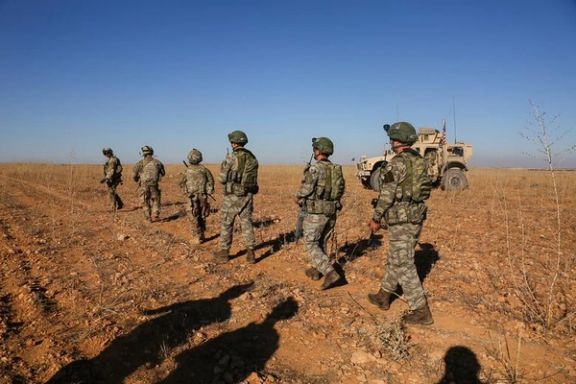
Six US troops in Syria suffered traumatic brain injuries during two attacks last week by Iran-backed militants, the Pentagon said on Thursday.
The US military said they were diagnosed during routine screenings in recent days.
The disclosure further raises the human toll among American forces from strikes and counterstrikes in Syria last week to a total of 12 US troops wounded. The attacks also killed an American contractor and injured another.
This will add more political pressure on the Biden Administration to deter Iran from supporting such attacks in the region.
In Congressional hearings last week and this week, Republican lawmakers accused the administration of being soft on Tehran, which they said is not deterred from killing and injuring Americans.
Of 83 attacks in Iraq and Syria since President Joe Biden took office, just four retaliations have taken place, according to the Pentagon.
Senator Tom Cotton, addressing Secretary of Defense Lloyd Austin in a hearing on Wednesday, said, “What kind of signal do we think this sends to Iran when they can attack us 83 times since Joe Biden has become president and we only respond four?”
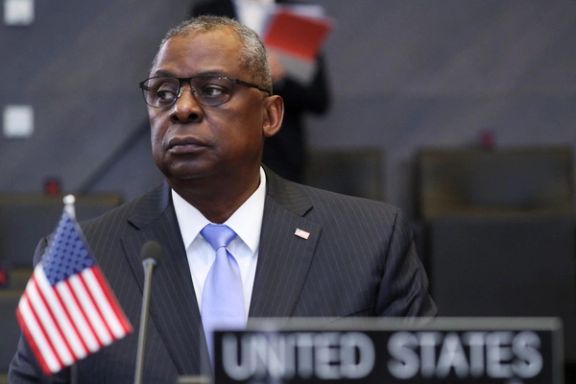
Republicans also accuse the administration of not informing Congress in a timely manner on March 23, while the Senate was debating a bill related to the issue of US forces stationed in the Middle East.
While Austin insisted Wednesday the information was relayed as soon as possible, his attempts to appease the Republicans fell on deaf ears.
“I don't believe you,” slammed Senator Cotton. “I believe that your office specifically withheld notification of this deadly strike against Americans because of the Rubio amendment on which we voted at midday directly touched on exactly this scenario, not repealing the use of force resolutions,” suggesting that the information was withheld because “the President couldn't certify that Iran was no longer attacking us in Iran and Syria”.
Pentagon spokesman Brigadier General Patrick Ryder said four service members suffered traumatic brain injuries at the US base near the Syrian city of Hasaka during a drone attack on March 23. Two others suffered injuries at mission support site Green Village during an attack on March 24.
"All personnel in the vicinity of a blast are screened for traumatic brain injury. So, these additional injuries were identified during post-attack medical screenings," Ryder told a news briefing.
The Pentagon also estimated eight militants were killed during retaliatory US air strikes against two Iran-linked facilities in Syria.
Ryder said the militants killed were not believed to be Iranian but were associated with the Islamic Revolutionary Guard Corps (IRGC).
That toll is lower than the one reported by a Syrian war monitoring group, which estimated that the air strikes and exchanges of fire killed three Syrian troops, 11 Syrian fighters in pro-government militias and five non-Syrian fighters who were aligned with the government.
President Joe Biden on Friday warned Iran that the United States would act forcefully to protect Americans.
The White House said on Monday that the incidents would not trigger a US pullback from its nearly eight-year-old deployment to Syria, where it is battling the remnants of Islamic State.
This is not the first time US troops in the region have been diagnosed with brain injuries from attacks.
In 2020, more than 100 US troops were diagnosed with traumatic brain injuries stemming from a missile attack by Iran against a base in Iraq.
Syria's foreign ministry has condemned last week's US strikes, saying Washington had lied about what was targeted and pledging on Sunday to "end the American occupation" of its territory.
Iran's foreign ministry accused US forces of “terrorist attacks” and targeting "civilian sites."
With reporting by Reuters
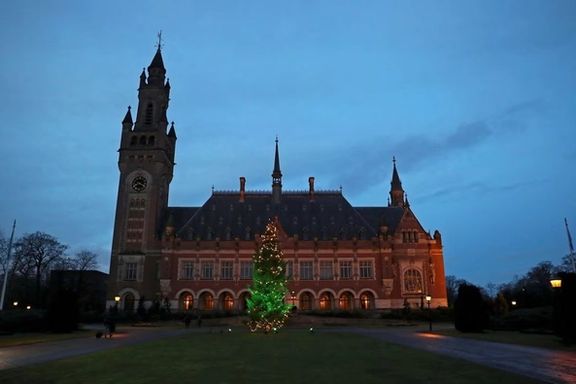
The International Court of Justice (ICE) on Thursday rejected Tehran’s legal bid to free up $1.75 billion of the Islamic Republic’s assets frozen by US court rulings.
In a 10-5 majority decision, judges said the UN International Court of Justice did not have jurisdiction to rule on the Iranian claim linked to the assets of the Central Bank of Iran (CBI) that were blocked to be paid in compensation to victims of a 1983 bombing in Lebanon and other attacks linked to the Islamic Republic. The CBI’s frozen assets of $1.75 billion in bonds, plus accumulated interest, are held in a Citibank account in New York.
The court found that the US move to seize assets of Iran and Iranians in the United States breached a treaty between the countries, signed in 1955, about 24 years before the establishment of the Islamic Republic. However, it ruled that it did not have jurisdiction based on the 1955 Treaty of Amity in the case of CBI’s funds because it is not a commercial enterprise, and thus not protected by the treaty.
The ICE judges accepted American lawyers’ contentions that the frozen central bank assets were state holdings not covered by the treaty, but ruled that assets belonging to non-government, commercial entities should be protected.

Iran argues the asset freeze was a breach of the 1955 Treaty of Amity, which promised friendship and cooperation between the two countries, even though the US and Iran have had no diplomatic relations since militant students took over the US Embassy in Tehran in 1979. Moreover, Washington terminated the Treaty of Amity in 2018 in response to an order by the International Court of Justice in a separate case to lift some sanctions against the Islamic Republic. Nonetheless, the ICE ruled that the treaty was in place at the time of the freezing of the assets of Iranian commercial companies and entities.
In its 67-page judgment on Thursday, the court also ruled that Washington had illegally allowed courts to freeze assets of some Iranian companies and ordered Washington to pay compensation, the amount of which should be negotiated between the countries. If they fail to reach a number, they will have to return to the Hague-based court for a ruling.
"The court has concluded the United States violated its obligations under (...) the treaty of amity," presiding judge Krill Georgian said. He added that Iran was entitled to compensation and the parties had 24 months to agree on a figure and if that did not work, the court would start new proceedings to determine the amount to be paid.
The court’s judgments are final and legally binding but the United Nations' top court has no means of enforcing them.
At hearings in September 2022, the Islamic Republic called the asset freeze an attempt to destabilize the Islamic Republic and a violation of international law. Tehran took its claim to the world court in 2016 after the US Supreme Court ruled that money belonging to Iran’s central bank could be used as compensation for the 241 American troops who died in the 1983 bombing. After the bombing of the US military base in Lebanon, a second blast nearby killed 58 French soldiers. Tehran has denied involvement, but a US District Court judge found Tehran responsible in 2003. The judge’s ruling said Iran’s ambassador to Syria at the time called “a member of the Iranian Revolutionary Guard – IRGC -- and instructed him to instigate the Marine barracks bombing.”
Acting Legal Adviser Rich Vise of the US State Department said in a written statement that the ruling rejected the "vast majority of Iran's case," notably where it concerned the assets of the central bank, adding that "This is a major victory for the United States and victims of Iran’s state-sponsored terrorism."
Iran's foreign ministry also reacted to the Thursday ruling, hailing the decision as "highlighting the legitimacy" of its positions and "expressing the wrongful behavior of the United States".
Tehran’s talks with world powers to revive the 2015 nuclear deal – officially known as the Joint Comprehensive Plan of Action (JCPOA) -- was going on with some vague prospects of success but ultimately collapsed after Russia invaded Ukraine. Russia was an active player in the talks from April 2021 to February 2022, when it invaded Ukraine. The negotiations in Vienna ended in early March. Some Iranian observers suggest that the West is not likely to respond to Iran's renewed calls for nuclear talks unless Tehran stops supplying weapons to Moscow in its war.

A video from the meeting of the Iranian and Russian foreign ministers in Moscow Wednesday has led to controversy in Iran.
According to reports and the video published in Tehran media, Hossein Amir-Abdollahian was waiting in his car at the Russian foreign ministry to be formally welcomed by Foreign Minister Sergey Lavrov, but the Russian top diplomat did not emerge from the building.
When Amir-Abdollahian entered, Lavrov asked him, "Didn't you want to get off the car," and the Iranian foreign minister says, “I was waiting.” Lavrov asks what he was waiting for, but the Iranian foreign minister mumbles and does not answer.
Many in Iran have reacted with anger. Cleric Rahmatollah Bigdeli said on Twitter, “This much disrespect to the authorities of a country by Russian officials is shameful!”
Some others say the disrespect by Lavrov in front of reporters was to humiliate the Iranian foreign minister, adding that Iranian regime officials are “Russophiles”.
Another user compares Lavrov’s move with President Vladimir Putin’s welcoming of the UAE’s leader Sheikh Zayed bin Sultan Al Nahyan.
In that video, Putin gives his overcoat to the Arab leader in the cold Moscow weather.
However, Iran’s Foreign Ministry Spokesman claimed Thursday that Amir-Abdollahian was waiting for a few minutes inside the car for the other delegation members to join him, because it was raining in Moscow.
This is not the first time the Russians are apparently disrespecting Iranian authorities. In January 2022 during President Ebrahim Raisi’s visit to Moscow neither Putin nor any senior Russian official escorted him upon his departure.

Iran's daily Covid infections have risen alarmingly as two-week New Year (Nowruz) holidays come to an end with 627 people admitted to intensive care this week.
Hossein Farshidi from the country’s Ministry of Health warned that a new wave of Covid-19 has seen 13 cities put on “red alert”.
The festive season which began on since March 17 saw hundreds of thousands of Iranians travel the country to visit friends and take holidays.
Iranian media quoted Hamid Souri, a professor of epidemiology at Shahid Beheshti University of Medical Sciences that "Due to the progressive nature of the pandemic and the high pathogenicity of Omicron sub-variants, this process can become volcanic.”
Warning that the new wave should be taken seriously, Souri urged the Ministry of Health and government agencies to “quickly control the outbreaks.”
The slow rate with which the red alert was issued garnered criticism on social media where those who have fallen ill criticised the response.
Iran was the second country after China where the pandemic started in February 2020 and according to disputed government figures has killed more than 145,000 people. However, some government officials and doctors have said that the actual death toll was at least twice more than what the government has announced.
Iran was also slow in vaccinating its population, because Supreme Leader Ali Khamenei banned Western vaccines in January 2021.
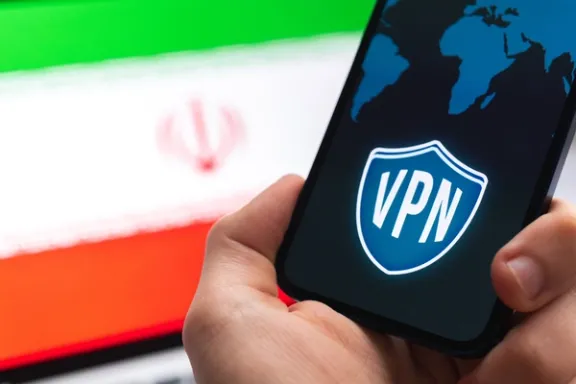
If you live in Iran, you are likely to need not one, but several virtual private networks (VPNs) just to be able to make a simple WhatsApp call or check your Instagram.
Millions of Iranians circumnavigate internet restrictions imposed by the government by purchasing VPNs or downloading them from the internet on their phones and computers. Those that are for free often do not work, but quite often the paid VPNs also fail to work as the authorities continuously identify and block them. Such restrictions have hugely increased since anti-government protests that ensued after the death of the 22-year-old Mahsa Amini in ‘morality police’ custody in late September.
DATA.AI’s map application rankings and store data indicate that five of the top applications used by Iranians and downloaded from Google Play belong to the VPN category with the rest consisting of communications and social media applications including WhatsApp, Telegram, Instagram, Twitter and YouTube all of which are blocked.
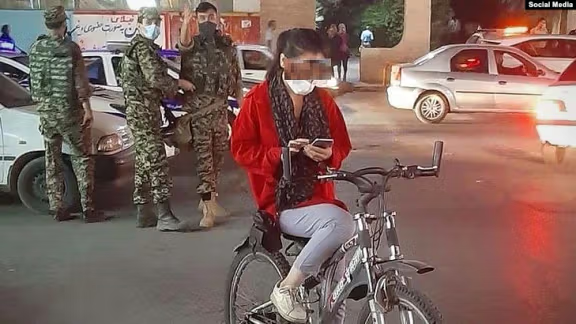
Google also said in October there was a spike in demand from Iran for its Jigsaw subsidiary's open-source Outline tool which allows third parties to set up secure VPNs resistant to disruption and censorship efforts.
Currently Google Play, where users could download VPNs, and occasionally Google Maps, Google Chat and Google Meet also become unavailable depending on the type of VPN one has installed on their devices.
“Only with a proxy [server] and with difficulty I can open my Telegram to download configurations that let me open Instagram and WhatsApp. I need another anti-filtering software for Twitter and heavy applications that have to be downloaded from Google Play which is also blocked,” a twitter user wrote Tuesday, and damned the Islamic Republic for making online access so difficult.
This viral video on Instagram shows a monkey hitting his phone angrily and swearing for not being able to connect to any of the “100s of VPNs” installed on the phone
"Daily demand for virtual private network (VPN) services in Iran is up over 3,000% compared to before the protests," Simon Migliano, the head of research at Top10VPN, told Axios in October.
Government restrictions were meant to stop people from sharing news and images of the protests that could motivate a larger segment of the population to join in. There are much fewer protests now, but the use of VPNs appears to have continued to grow as the government keeps its hold on the flow of information.
In January, the judiciary and the ministry of communications said they would take legal action against "unauthorized” providers of VPNs and internet circumvention tools.
By blocking access to applications such as WhatsApp and VPNs that make access to them possible, authorities are trying to force Iranians to use domestically-developed applications such as Soroush, Eitta, and Bale but many Iranians do not trust these applications which they say the government can control and use for spying on them.
Many VPNs are not safe, either. In January, Bitdefender, a private cybersecurity company, revealed information about an Iranian spyware that stole users’ sensitive information through a VPN software.
Extensive filtering has highly damaged internet-based businesses and around 10 million whose livelihoods depends on selling their products and services by advertising on social media. Small businesses, particularly those run from homes by women or small farms in rural areas whose numbers exponentially grew after the Covid pandemic, very heavily relied on Instagram for advertising and WhatsApp for communication with potential customers.
Officials, including Supreme Leader Ali Khamenei, have repeatedly criticized free access to the internet in recent years, and have been trying to prevent the free flow of information by expanding the National Information Network (NIN), a national intranet.